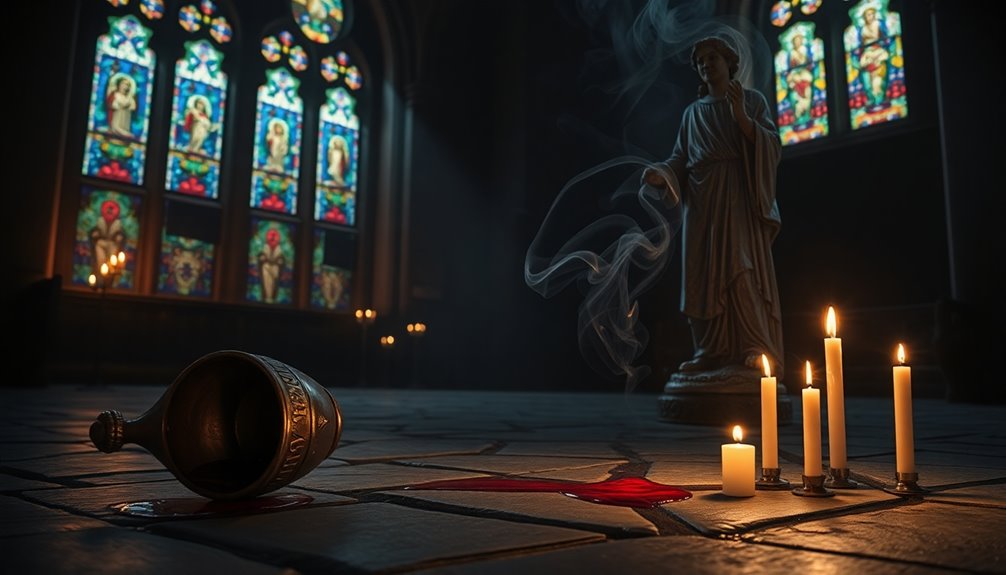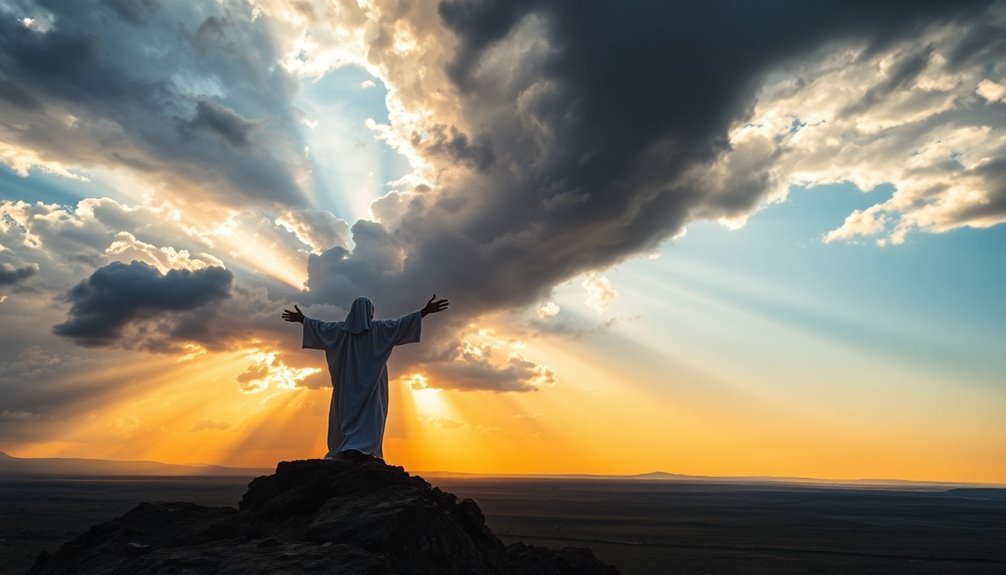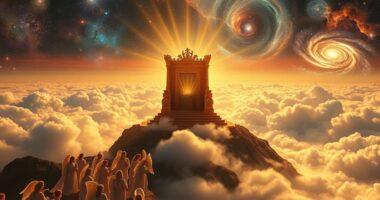Mount Moriah is crucial in the Bible, representing themes of sacrifice and covenant. It's first mentioned in Genesis 22, where God tests Abraham by asking him to sacrifice Isaac. Later, King David purchases land there for an altar, and Solomon builds the First Temple on this sacred ground. Moriah's significance continues, linking to the sacrifices central to Jewish worship and foreshadowing Jesus' ultimate sacrifice. While debates about Moriah's exact location persist, its theological impact remains clear. Want to uncover more about its profound connections throughout biblical history?
Key Takeaways
- Mount Moriah is first mentioned in Genesis 22 as the site where Abraham nearly sacrifices Isaac, symbolizing faith and obedience.
- It is identified as the location of King David's purchase for an altar and the site of Solomon's First Temple construction.
- Moriah holds significant sacrificial meaning, representing atonement and the covenant relationship between God and His people.
- The site is central to both Jewish and Christian theology, foreshadowing Jesus' ultimate sacrifice near Moriah.
- Ongoing debates exist regarding Moriah's precise boundaries, with some viewing it as a broader mountainous region rather than a specific hill.
Introduction

Mount Moriah stands as a powerful symbol of faith and divine promise in the Bible. This sacred site first appears in Genesis 22, where God commands Abraham to sacrifice his beloved son Isaac. This moment not only highlights Abraham's unwavering faith but also foreshadows the profound sacrifices that will resonate throughout biblical history.
Later, in 2 Chronicles 3:1, Mount Moriah becomes the location where King Solomon constructs the First Temple, solidifying its importance as a central site for Jewish worship and a testament to God's presence among His people.
The historical significance of Mount Moriah doesn't end there. It's believed to be the place where King David purchased Araunah's threshing floor to build an altar after a devastating plague, as described in 2 Samuel 24. This act further cements the site's association with sacrifice and devotion.
Even today, the Western Wall, a remnant of Herod's Temple built on Mount Moriah, remains a vital pilgrimage destination for Jews. This enduring connection underscores how Mount Moriah embodies the themes of sacrifice, faith, and God's promise throughout biblical history.
Mount Moriah's Sacrificial Significance

When you explore Mount Moriah's sacrificial significance, you'll find key moments that shaped its legacy in the Bible.
From Abraham's test of faith to David's purchase for an altar, each event highlights the importance of sacrifice.
You'll also see how Solomon's Temple solidified this mountain as a central place of worship and atonement for the Israelites.
Primary Bible References
The profound significance of Mount Moriah in the Bible centers around its role as a site of sacrifice and divine provision. In Genesis 22:2, God commands Abraham to offer his son Isaac as a burnt offering on Moriah. This moment showcases Abraham's obedience, demonstrating his unwavering faith in God's plan.
As you reflect on this narrative, consider how Abraham's willingness to sacrifice his beloved son foreshadows God's own sacrifice of Jesus, the Lamb of God.
The theme of divine provision emerges strongly here. As Abraham prepares to carry out God's command, He provides a ram as a substitute for Isaac, emphasizing the importance of sacrificial atonement. This act not only highlights God's mercy but also connects the sacrificial practices established in the Old Testament with the future redemption offered through Christ.
Later, in 2 Chronicles 3:1, you learn that Mount Moriah is where Solomon built the First Temple, solidifying its central role in Jewish worship.
The sacrifices performed on this sacred ground link directly to the overarching narrative of atonement and redemption, shaping your understanding of God's covenant with His people.
Secondary Bible References
Building on the foundation laid by Abraham's faith and the sacrificial acts performed on Mount Moriah, the site continues to hold profound significance in the biblical narrative. Here, you see Abraham's willingness to sacrifice his son Isaac as a testament to his obedience to the LORD (Genesis 22:1-2). This act not only demonstrated faith but also set a precedent for future sacrifices in the land.
Later, King David purchased Araunah's threshing floor on Mount Moriah, where he built an altar that halted a plague, reinforcing the site's role in sacrificial practices (2 Samuel 24:18-25).
Solomon, following in David's footsteps, constructed the First Temple on this sacred mount, establishing it as the central place of worship and sacrifice for the Israelites (2 Chronicles 3:1).
The sacrifices made here served as atonement for sins, symbolizing the covenant relationship between the Israelites and the LORD (Leviticus 16:27).
Furthermore, Christian theology views Jesus as the ultimate sacrifice, fulfilling the typology that began with Abraham and continued through the Temple sacrifices (Hebrews 13:12). Thus, Mount Moriah remains a cornerstone of sacrificial significance across both faiths.
Ancient Sacrificial Practices Overview

Ancient sacrificial practices in the Bible reveal a deep-seated belief in the need for atonement through blood offerings. At the heart of these rituals is the concept of substitutionary sacrifice, where the life of an animal, often a lamb, was given to restore the relationship between God and humanity. This practice is exemplified in the story of Abraham on Mount Moriah, where his willingness to sacrifice Isaac demonstrated profound obedience to God.
In the Jewish temple, daily sacrifices were an essential aspect of worship. These included burnt offerings and sin offerings, serving as expressions of repentance and a way to seek divine forgiveness.
During the Passover, the sacrificial lamb symbolized deliverance from slavery in Egypt and foreshadowed later sacrificial themes in Christianity.
The Day of Atonement (Yom Kippur) introduced the ritual of the scapegoat, where one goat was sacrificed while another carried away the sins of the people into the wilderness.
Throughout the Old Testament, these practices emphasized sin, redemption, and the need for God's mercy, laying the foundation for later theological developments in the biblical narrative.
Covenant Connections Explored Further

Mount Moriah serves as a pivotal intersection in the biblical narrative, embodying the profound covenant connections between God and His people. It's here that God tested Abraham's faith, commanding him to sacrifice Isaac (Genesis 22:1-2). This moment highlights the deep covenant relationship forged through trust and obedience.
Later, King David purchased Araunah's threshing floor on Moriah, establishing a sacred space for worship and sacrifice, which reinforced God's promise of His presence among His people (2 Samuel 24:18-25).
Solomon's construction of the First Temple on Mount Moriah fulfilled God's promise to David, creating a permanent dwelling place for His name and continuing the covenant theme of divine presence (2 Chronicles 3:1).
Beyond its Old Testament significance, Moriah resonates in Christian theology as a foreshadowing of Jesus' sacrificial death at Golgotha, linking the Old Testament covenant with the New Testament promise of redemption (Hebrews 9:12).
Looking ahead, the anticipated future construction of a third temple on Mount Moriah aligns with prophetic expectations, further reinforcing the ongoing significance of the covenant relationship between God and His people (Ezekiel 40-48).
Misunderstanding Moriah's Geographical Location

When you look into Mount Moriah, you'll find that its identity is often misunderstood, leading to confusion about its true location.
Scholars propose alternative sites, adding layers to the debate about where Abraham was meant to sacrifice Isaac.
Understanding these different viewpoints can clarify the geographical significance of Moriah in biblical history.
Debunking Moriah's Identity Confusion
Confusion about the identity of Mount Moriah arises from a few key biblical references that seem to point to different locations. In Genesis 22, you read about Abraham's obedience when he prepares to sacrifice Isaac, and many interpret this event as occurring at Moriah. However, 2 Chronicles 3:1 states that Solomon built the Temple on the same site, often identified as the Temple Mount in Jerusalem. This overlap creates uncertainty.
Some scholars believe that "Moriah" might refer to a broader mountainous region rather than a single hill. This interpretation adds to the ambiguity surrounding its geographical location. Moreover, the Samaritan tradition identifies Mount Gerizim, not Moriah, as the site of Abraham's near-sacrifice, further complicating the matter.
Historical meanings attributed to "Moriah," such as "teaching-place" or "place of fear," can mislead discussions about its significance. Despite archaeological evidence supporting the identification of the Temple Mount in Jerusalem as Mount Moriah, ongoing debates regarding its precise boundaries and historical context continue.
Understanding these complexities helps clarify why Moriah's identity remains a topic of discussion.
Alternative Mount Locations Proposed
Although many associate Mount Moriah solely with the Temple in Jerusalem, alternative locations have been proposed that challenge this singular identification. Some scholars argue that the region referred to as Moriah in Genesis may represent a broader mountainous area, not just the specific site of the Temple. This interpretation opens the door to debates about Moriah's exact geographical location.
The Samaritan tradition, for instance, claims that the binding of Isaac happened on Mount Gerizim, located near modern-day Nablus. This contrasts sharply with the Jewish belief in Moriah's significance in Jerusalem, highlighting differing views on the matter. Various ancient texts also support the notion that Moriah could be linked to Shechem instead of Jerusalem.
Additionally, the Greek Septuagint translates Moriah as "high land," suggesting a more general mountainous region rather than a precise location. The differences in spelling and translation across various manuscripts further complicate pinpointing Moriah's identity.
These alternative proposals remind us of the complexities surrounding the geographical significance of Moriah, encouraging deeper exploration beyond the commonly accepted narratives.
Faith in Daily Decisions

When you face daily decisions, trusting God can guide you toward the right choices.
Just like Abraham and David, your faith can lead you to serve your community and make a positive impact.
Embracing this mindset not only strengthens your relationship with God but also enriches those around you.
Trusting God in Choices
Often, we find ourselves faced with choices that challenge our faith and require us to trust God's guidance. Take Abraham's obedience as a profound example. When asked to sacrifice Isaac on Mount Moriah, Abraham demonstrated unwavering faith, believing that God would provide. His readiness to obey, even in such a heart-wrenching situation, highlights the importance of trusting God in our daily decisions.
The significance of Mount Moriah extends beyond Abraham's story. King David's decision to purchase Araunah's threshing floor for an altar, despite the turmoil around him, illustrates the necessity of honoring God through our choices. It's a reminder that even in crises, we can seek divine guidance to make decisions that reflect our commitment to Him.
Additionally, Solomon's dedication of the Temple on Mount Moriah emphasizes how worshiping God and committing to His plans shape our significant life choices. The narrative encourages you to seek God's direction, trusting that His plans are ultimately for your good and His glory.
In every decision, big or small, remember that trusting God can lead to peace and purpose, guiding you along your journey.
Community Service Initiatives
Building on the foundation of trusting God in our choices, community service initiatives inspired by the faith demonstrated on Mount Moriah can transform how you approach daily decisions.
By reflecting Abraham's obedience and willingness to sacrifice for a greater purpose, these initiatives encourage you to engage in selfless service within your community.
Participating in outreach programs, such as food drives, shelter assistance, and educational initiatives, allows you to embody the sacrificial themes found in the biblical narrative.
These acts of service don't just meet immediate needs; they also reinforce your faith, reminding you of the importance of generosity and compassion.
As you engage in community service, you'll find opportunities to reflect on your decisions, aligning them with the values of faith and divine provision illustrated in the story of Mount Moriah.
Faith-based organizations can help inspire these efforts, emphasizing the connection between your spiritual beliefs and tangible acts of service in everyday life.
Ultimately, embracing community service initiatives can deepen your commitment to living out your faith, encouraging a culture of support and outreach that uplifts those in need.
Moriah's Role in Redemption

Mount Moriah frequently emerges as a pivotal location in the biblical narrative of redemption. You can trace its significance back to Abraham, who, in a profound test of faith, nearly sacrificed Isaac there. This act foreshadows God's ultimate provision of Jesus as the sacrificial Lamb, bridging the gap between humanity and divine grace.
David's purchase of Araunah's threshing floor on Moriah established it as the site for worship, leading to the construction of Solomon's Temple, the esteemed temple of the LORD. This First Temple became central for Israelite worship and sacrifices, symbolically connecting God's presence with His people.
Further redemption is rooted in Jesus' crucifixion, believed to occur near or on Moriah, fulfilling the sacrificial system as He embodies the Passover Lamb, atoning for humanity's sins.
Moreover, the prophetic vision of a third temple on Mount Moriah emphasizes its enduring significance. This future restoration indicates a continued promise of God's presence among His people, reinforcing Moriah's role as a cornerstone in the ongoing story of redemption.
Additional Resources

For those looking to explore the significance of Mount Moriah further, a variety of resources can enhance your understanding. One great starting point is the Bible itself, particularly Genesis 22:2, which highlights the profound moment when Abraham was commanded to sacrifice Isaac.
You might also find it insightful to read 2 Chronicles 3:1, revealing Mount Moriah as the site of Solomon's Temple, a pivotal place for Israelite worship.
Visiting the Old City of Jerusalem offers a unique opportunity to experience Mount Moriah firsthand. The Western Wall, a remnant of Herod's expansion of the Second Temple, remains a vital pilgrimage site for many Jews today.
You can also explore the Temple Mount, which encompasses Mount Moriah and features significant religious sites like the Al-Aqsa Mosque and the Dome of the Rock.
For deeper insights, consider diving into archaeological studies that continue to uncover layers of history at Mount Moriah, shedding light on ancient worship practices and sacrifices that took place years later.
These resources will enrich your knowledge and appreciation of this sacred site.
Frequently Asked Questions
What Was the Significance of MT Moriah in the Bible?
You might find the significance of Mount Moriah fascinating, as it represents a place of profound faith and obedience.
It's where pivotal moments occur, like Abraham's near-sacrifice of Isaac, showcasing trust in divine will.
Later, King David's purchase of land there leads to an altar that stops a plague.
Ultimately, it becomes the site for Solomon's Temple, establishing a central place of worship, making it a vital location in spiritual history and tradition.
Where Is Mount Moriah Located Today?
Today, you'll find Mount Moriah in the heart of Jerusalem, specifically at the Temple Mount.
This area is home to significant religious sites, including the Al-Aqsa Mosque and the Dome of the Rock.
It's a place where history intertwines with spirituality, making it a focal point for various faiths.
As you explore, you'll see how this location remains vital in contemporary religious and political dynamics.
Are Mount Moriah and Mount Zion the Same Place?
No, Mount Moriah and Mount Zion aren't the same place.
You might find it interesting that they represent different aspects of a historical landscape.
While Mount Zion is often seen as a symbol of a city or community, Mount Moriah is specifically known for its significance in certain events.
If you explore their meanings further, you'll discover how each site holds unique importance in various narratives.
What Events Took Place on Mount Moriah?
When you think about Mount Moriah, consider the significant events that unfolded there.
You might remember Abraham's faith test when he was asked to sacrifice Isaac, a moment of intense devotion.
Later, King David bought a threshing floor to build an altar, which played a critical role in stopping a plague.
Ultimately, Solomon constructed the First Temple, establishing a sacred space for worship and sacrifice, making it a cornerstone of faith in the region.










